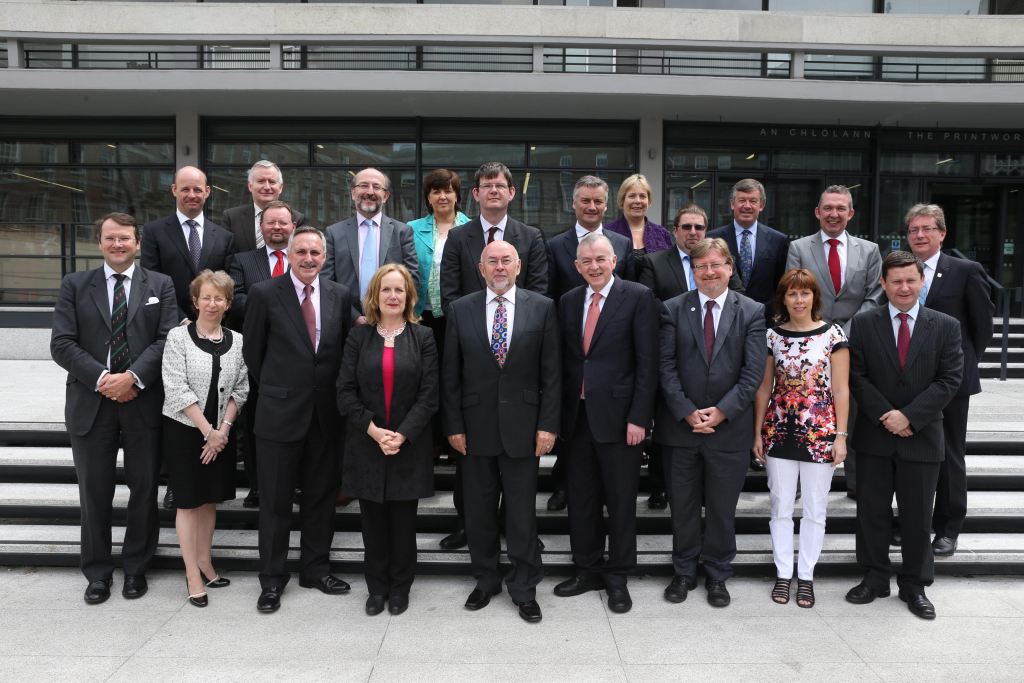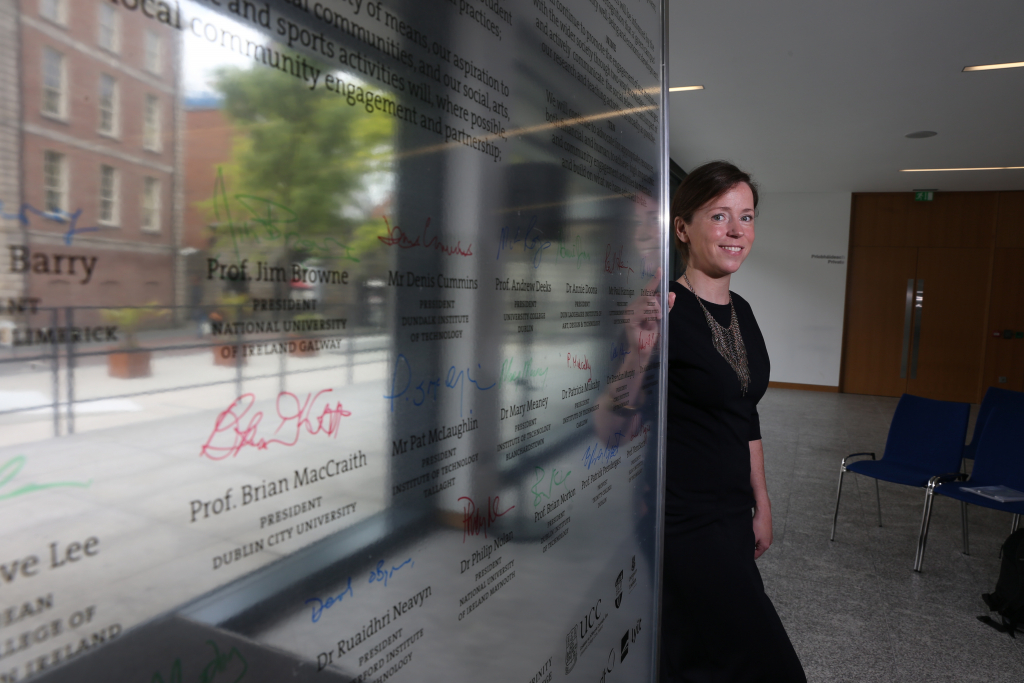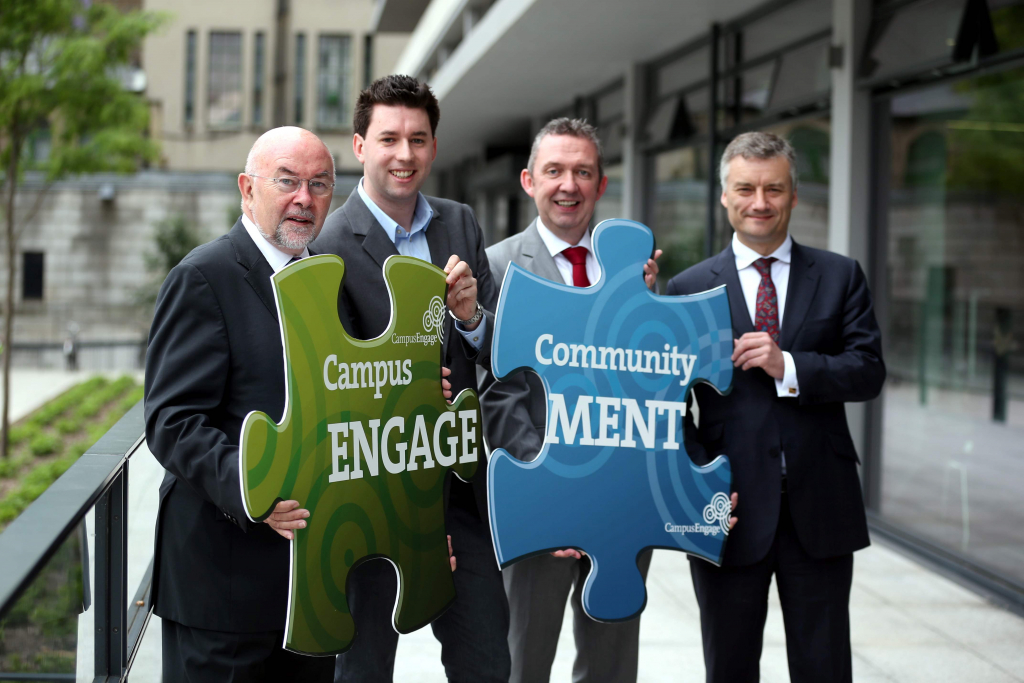Press Release – 16th June 2014
At a landmark event in Dublin Castle today 20 Presidents of Higher Education Institutions came together as leaders of higher education in Ireland, to publicly sign up to the 10 point Campus Engage Charter on Civic and Community Engagement. Under the charter the presidents underscore their commitment to the civic and community engagement role and responsibilities of their institutions.
Launching the Charter, Minister for Education and Skills, Mr. Ruairi Quinn T.D said, “Today is an important recognition of commitment by Ireland’s higher education institutions to build on what has been achieved to date and place Ireland at the fore internationally in terms of promoting civic and community engagement by higher education. The importance of ‘engagement’ is recognised in the National Strategy for Higher Education to 2030, and in the HEA’s performance framework, which both ask higher education institutions to engage openly with their community and wider society and for this to infuse every aspect of their mission. I congratulate all involved in the realisation of the Charter, and specifically to the Presidents for their commitment.”
The launch of an Irish Charter for Civic and Community Engagement builds on the pioneering actions taken by other countries including Australia, UK and the US, who have signed up to similar agreements at national level to support and strengthen the civic role and responsibilities of higher education.
Opening the launch event, Prof Paul Hannigan, President of Letterkenny IT and Chair of Institutes of Technology Ireland (IOTI) said, “This Irish Charter aligns us with best practice and captures the essential principles and the underlying purpose of engagement with communities as well as with enterprise”.
The Charter was developed by Campus Engage, a HEA funded, national initiative with representation from 17 HEIs, IOTI and the IUA. Its role is to promote innovative teaching, learning and other activities in the area of civic and community engagement.
In today’s times of economic uncertainly, and a policy context focused on developing our “knowledge society” there has been considerable emphasis on the contribution of Higher Education Institutions to economic recovery. Campuses across the country are building capacity and activating ‘bottom up’ student and staff-led initiatives such as community- based learning, community-based research and volunteering, to tackle the skills deficit, contributing community-based research to inform public policy, engaging in political debate and providing evidenced-informed media debate on matters of public policy and public concern.
Closing the launch Prof. Patrick Prendergast, Provost of Trinity College Dublin and Chair of the Irish Universities Association (IUA) said, “Closing the launch, Dr Patrick Prendergast, IUA Chair and Provost of Trinity College Dublin, said: “Civic engagement benefits both students and communities. Students get transferrable, ‘work-ready’ skills through accredited learning realised in volunteering, and community-based research and learning. These activities improve students’ capacity for problem-solving and critical thinking. Communities are enhanced by students’ energy and engagement with the public good.”
ENDS
Issued by
Lia O’Sullivan, Communications and Projects Manager, Irish Universities Association. 48 Merrion Square, Dublin 2.
+353 (o)1 6764948 / 7996022 email: lia.osullivan@iua.ie
For further information and case studies for feature pieces contact Kate Morris, National Co-ordinator of Campus Engage, IUA, 086 8166490. Email: kate.morris@iua.ie
Additional Notes:
Campus Engage is a national initiative which works with 17 higher education institutions to enable and embed civic and community engagement activity across campuses and communities in Ireland.
Campus Engage promotes community-based research, community-based learning and volunteering. Hundreds of community-based organisations currently work with the staff and students of our higher education institutions in these fields. Through practical experience this enables students, across all disciplines, to obtain ‘work ready’ skills which will meet the needs of Irish community-services employers. It also shapes the teaching and learning experience around real community needs. In addition, Campus Engage promotes new knowledge exchange between academic, community service providers, policy makers, and the public.
Campus Engage in action:
● Promotes innovative teaching, learning and other activities in the area of civic and community engagement
● Supports the implementation of accredited experiential community-based learning, community-based research, and volunteering to build transferable, applied ‘work ready skills’
● Undertakes research to build an evidence-base for the positive social impact of higher education civic and community engagement
● Develops resources and offers capacity building training to higher education staff and community partners
● Facilitates the creation of opportunities for campus-community partnerships
● Supports campus-community volunteering opportunities
● Builds awareness and promotes debate to inform our national policy framework for civic and community engagement.
More information is available on www.campusengage.ie
Benefits of Civic Engagement:
Community-based research, teaching and learning, and volunteering presents opportunities for students to test acquired knowledge and skills, and increase the depth of their academic experience. It allows scope for ‘real life’ problem solving, and critical thinking in a community work place.
On a personal level, community-based activities increase learners’ sense of personal achievement and wellbeing. Surveys and evidence-reviews have shown that volunteers report lower levels of depression, increased life satisfaction and enhanced well-being.
In terms of civic responsibility, community engagement increases understanding of the facets of community-service, social justice, diversity, empathy and social responsibility. It encourages citizenship skills and greater involvement in community service after graduation.
While the number one health issue for young people is their mental health, we have evidence that community-based activities increase learners’ sense of personal achievement, sense of belief in oneself to achieve when the odds seem stacked against them, lowering levels of depression, increasing life satisfaction and enhancing wellbeing.
As the world economy no longer ‘pays for what employees know but for what they can do with what they know’, accredited community-based learning and research is becoming mandatory on campuses in countries such as the United States. The Person’s The Learning Curve – Education and Skills for Life 2014 report, which places Ireland’s education system in 9th place globally, listed 8 priority skills current students need to meet the ever changing needs of the global market. These include leadership; emotional Intelligence; entrepreneurship; global citizenship; problem solving; and team-work.
The National Strategy for Higher Education, 2011, 77 states:
Engagement with the wider community must become more firmly embedded in the mission of higher education institutions. Higher education institutions need to become more firmly embedded in the social and economic contexts of the communities they live in and serve.


